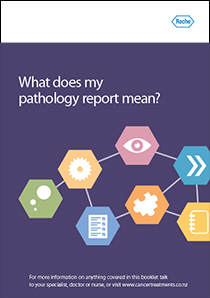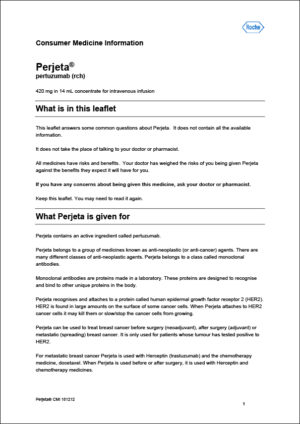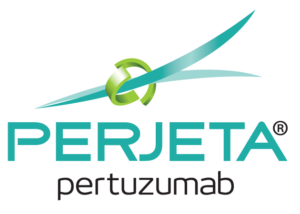Perjeta®
(pertuzumab)
Pronounced Pur-jet-a
Perjeta, also known as pertuzumab, is a targeted therapy for the treatment of early HER2-positive breast cancer and advanced HER2-positive breast cancer.
Perjeta is used in combination with trastuzumab and chemotherapy. Perjeta for the treatment of early HER2-positive breast cancer is not funded. This means you will need to pay for it privately.
When used for the treatment of advanced HER2-positive breast cancer, Perjeta is fully funded by PHARMAC for those who meet pre-defined criteria.
Clinical trials have shown that Perjeta is effective in treating early HER2-positive breast cancer and advanced HER2-positive breast cancer.
Ask your doctor if Perjeta is right for you.
Perjeta for early HER2-positive breast cancer
Perjeta in combination with trastuzumab and chemotherapy may be given before surgery (neoadjuvant treatment) and/or after surgery (adjuvant treatment).
Neoadjuvant therapy
To learn more about Perjeta as neoadjuvant therapy, download the Perjeta neoadjuvant patient booklet by clicking here. Breast Cancer Trials have developed a tool for women recently diagnosed with early-stage breast cancer for whom treatment with chemotherapy and/or hormonal therapy before surgery may be an option. Go to myneoguide.com to access the online tool or to download the booklet.
Adjuvant (after surgery) therapy
HER2-positive breast cancer is an aggressive form of breast cancer. Despite having surgery to remove the cancer, it may recur, or come back. Your doctor will look at a variety of factors, such as lymph node status, hormone receptor status, tumour size and grade, and others, to determine if the cancer you have has a high likelihood of coming back. An explanation of these terms are available to download in the What does my pathology report mean? patient booklet by clicking here.

Your doctor may prescribe Perjeta after surgery if your breast cancer has a high likelihood of coming back. The goal of adjuvant treatment is to kill cancer cells that may be left in your breast or in the rest of your body after surgery. Perjeta and trastuzumab-based therapy after surgery has been shown to lower the risk of early HER2-positive early breast cancer coming back in certain patients.
Perjeta helps most people with HER2-positive breast cancer but it may have some unwanted side effects. Sometimes these are serious, most of the time they are not. For more information on what to expect during treatment with Perjeta, see the Perjeta Consumer Medicine Information by clicking here.
Perjeta for the treatment of early HER2-positive breast cancer is not funded by PHARMAC which means you will need to pay privately for your treatment.
Ask your doctor if Perjeta is right for you
Perjeta for advanced HER2-positive breast cancer
In advanced HER2-positive breast cancer, Perjeta in combination with trastuzumab and chemotherapy is fully funded by Pharmac for those who meet pre-defined criteria.
In the Handy Resources section below, the Perjeta for advanced HER2-positive Breast Cancer booklet and the Consumer Medicines Information contain useful information on Perjeta such as what it is for, how it works, things to consider before starting treatment and what to expect during treatment including side effects.
How to access Perjeta
Perjeta for advanced HER2-positive breast cancer is fully funded for those who meet pre-defined criteria.
Perjeta for early HER2-positive breast cancer is not currently funded by PHARMAC. This means you will need to pay for it privately.
If you have health insurance, carefully check what’s covered — every health insurance provider has different rules and benefits that cover cancer treatment, surgery, tests and appointments. Roche also offer support through a Cost Share Programme.
The Perjeta Cost Share Programme
• offers assistance with the cost of your medicine. A number of doses (or cycles) of the medicine are provided at no charge (the cost of the medicine only). The total amount you will pay for Perjeta is capped.
• once a patient has reached the cap, Roche will provide ongoing Perjeta at no cost. However, other costs such as doctor fees and administration costs will still apply.
• for more information on the Perjeta Cost Share Programme, talk to your doctor.
Ready to take the next step
Making decisions about treatment options involves working through the advantages and disadvantages, so you can decide what may work best for you and your loved ones.
Because every situation is different, it’s important to speak to your doctor to find out if Perjeta is right for you.
Talking to your doctor about Perjeta
To help you in this process, we’ve put together a discussion guide to help you begin a conversation with your doctor. Print it off, take it along to your next appointment, and take notes in the spaces provided.
For further information about private treatment providers click here.
You can also talk to your current doctor about referral to a private doctor or treatment centre.
To learn more about how medicines become available in New Zealand, click here.
Handy resources
The following resources contain useful information on Perjeta such as what it is for, how it works, things to consider before starting treatment and what to expect during treatment including side effects.

Perjeta for early HER2-positive breast cancer patient booklet
DOWNLOAD
Perjeta for advanced HER2-positive breast cancer patient booklet
DOWNLOAD
What does my pathology report mean?
DOWNLOAD
Perjeta Consumer Medicine Information
DOWNLOAD

